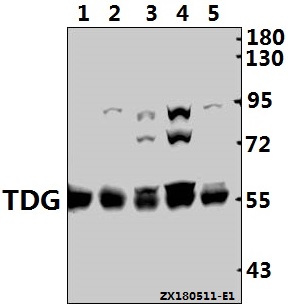Product Name :
TDG (K90) polyclonal antibody Background :
In the DNA of higher eukaryotes, hydrolytic deamination of 5-methylcytosine to thymine leads to the formation of G/T mismatches. G/T mismatch-specific Thymine DNA Glycosylase (TDG) is a nuclear protein which corrects G/T mismatches to G/C pairs by hydrolyzing the carbon-nitrogen bond between the sugar-phosphate backbone of the DNA and the mispaired thymine. TDG also corrects a subset of G/U mispairs inefficiently removed by the more abundant uracil glycosylases. Retinoic acid receptors interact physically and functionally with TDG, enhancing the ability of the retinoid X receptor and the retinoid X receptor/retinoid acid receptor complex to bind to their response elements. TDG interacts with, and is covalently modified by, the ubiquitin-like proteins SUMO-1 and SUMO-2/3, resulting in a reduction of the DNA substrate and AP site binding affinity of TDG. This sumoylation is associated with a significant increase in enzymatic turnover in reactions with a G/U substrate and the loss of G/T processing activity. Product :
Rabbit IgG, 1mg/ml in PBS with 0.02% sodium azide, 50% glycerol, pH7.2 Storage&Stability :
Store at 4°C short term. Aliquot and store at -20°C long term. Avoid freeze-thaw cycles. Specificity :
TDG (K90) polyclonal antibody detects endogenous levels of TDG protein. Immunogen :
Synthetic peptide, corresponding to amino acids 28-109 of Human TDG. Conjugate :
Unconjugated Modification :
Unmodification
TDG (K90) polyclonal antibody Background :
In the DNA of higher eukaryotes, hydrolytic deamination of 5-methylcytosine to thymine leads to the formation of G/T mismatches. G/T mismatch-specific Thymine DNA Glycosylase (TDG) is a nuclear protein which corrects G/T mismatches to G/C pairs by hydrolyzing the carbon-nitrogen bond between the sugar-phosphate backbone of the DNA and the mispaired thymine. TDG also corrects a subset of G/U mispairs inefficiently removed by the more abundant uracil glycosylases. Retinoic acid receptors interact physically and functionally with TDG, enhancing the ability of the retinoid X receptor and the retinoid X receptor/retinoid acid receptor complex to bind to their response elements. TDG interacts with, and is covalently modified by, the ubiquitin-like proteins SUMO-1 and SUMO-2/3, resulting in a reduction of the DNA substrate and AP site binding affinity of TDG. This sumoylation is associated with a significant increase in enzymatic turnover in reactions with a G/U substrate and the loss of G/T processing activity. Product :
Rabbit IgG, 1mg/ml in PBS with 0.02% sodium azide, 50% glycerol, pH7.2 Storage&Stability :
Store at 4°C short term. Aliquot and store at -20°C long term. Avoid freeze-thaw cycles. Specificity :
TDG (K90) polyclonal antibody detects endogenous levels of TDG protein. Immunogen :
Synthetic peptide, corresponding to amino acids 28-109 of Human TDG. Conjugate :
Unconjugated Modification :
Unmodification
-
 Western blot (WB) analysis of TDG (K90) pAb at 1:1000 dilution Lane1:CT-26 whole cell lysate(40ug) Lane2:PC12 whole cell lysate(40ug) Lane3:HCT116 whole cell lysate(40ug) Lane4:HEK293T whole cell lysate(40ug) Lane5:Hela whole cell lysate(40ug)
Western blot (WB) analysis of TDG (K90) pAb at 1:1000 dilution Lane1:CT-26 whole cell lysate(40ug) Lane2:PC12 whole cell lysate(40ug) Lane3:HCT116 whole cell lysate(40ug) Lane4:HEK293T whole cell lysate(40ug) Lane5:Hela whole cell lysate(40ug)
Bioworld Biotech only provide peptides for our antibodies and do not provide additional peptide customization services.
Price/Size :
USD 368/1mg/vial
Tips:
For phospho antibody, we provide phospho peptide(0.5mg) and non-phospho peptide(0.5mg).Describe :
Blocking peptides are peptides that bind specifically to the target antibody and block antibody binding. These peptide usually contains the epitope recognized by the antibody. Antibodies bound to the blocking peptide no longer bind to the epitope on the target protein. This mechanism is useful when non-specific binding is an issue, for example, in Western blotting (WB) and Immunohistochemistry (IHC). By comparing the staining from the blocked antibody versus the antibody alone, one can see which staining is specific; Specific binding will be absent from the western blot or IHC performed with the neutralized antibody.Formula:
Synthetic peptide was lyophilized with 100% acetonitrile and is supplied as a powder. Reconstitute with 0.1 ml DI water for a final concentration of 10 mg/ml.The purity is >90%,tested by HPLC and MS.
Storage:
The freeze-dried powder is more stable. For short time at 2-8°C. For long term storage store at -20°C.
Note :
This product is for research use only (RUO only). Not for use in diagnostic or therapeutic procedures.
 TDG (K90) polyclonal antibody
TDG (K90) polyclonal antibody  Datasheet
Datasheet COA
COA MSDS
MSDS SHIP
SHIP